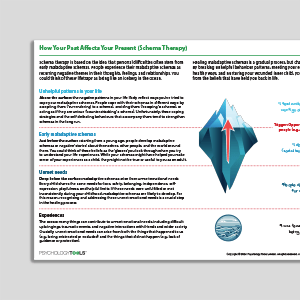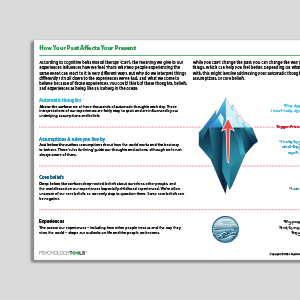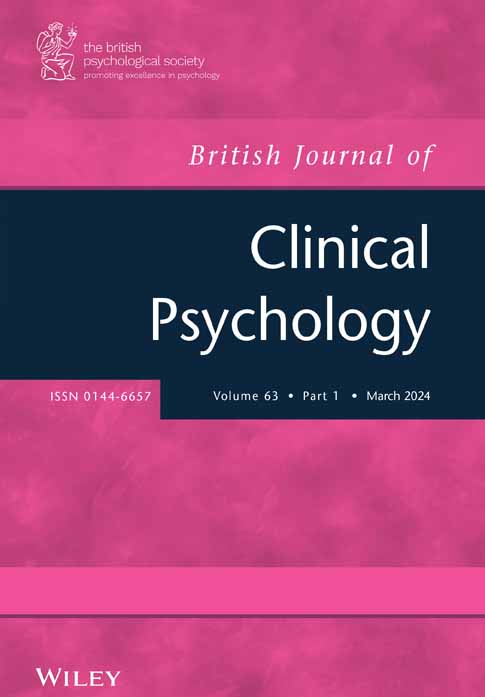5th March 2024 Newsletter

This week we’re releasing two resources for familiarizing your clients with key concepts from both schema therapy and CBT, outlining how the past can affect the present according to both of these conceptual models. We’ve also expanded our available German translations with several new additions to our cognitive distortions series.
Our research roundup highlights a paper examining the influence of initial assessments on treatment initiation and subsequent dropout rates. We also explore a meta-analysis looking at the ‘revolving door’ phenomenon, in which individuals seek treatment for seemingly separate mental disorders across their life.

How Your Past Affects Your Present (Schema Therapy)
Schema therapy suggests that enduring psychological challenges often originate from unmet emotional needs, leading to the development of early maladaptive schemas (EMS) and distinct coping styles. By employing the metaphor of an iceberg, How Your Past Affects Your Present (Schema Therapy), introduces clients to these fundamental ideas of schema therapy, providing psychoeducation and helping support case conceptualization.

How Your Past Affects Your Present (CBT)
Cognitive behavioral therapy (CBT) describes three levels of cognition—automatic thoughts, assumptions, and core beliefs—which are shaped by our experiences. Using the metaphor of an iceberg, How Your Past Affects Your Present (CBT) is designed to familiarize your clients with these cognitive layers and explain how they interact with one another.

New German Translations
In line with our mission to make our resources more accessible to global audiences, we have uploaded 5 German translations from our popular cognitive distortion series: Personalizing, Self-Blame, “Should” Statements, Social Comparison, and Thought-Action Fusion.

The Influence of Initial Assessments on Treatment Outcomes
Do clients’ experiences of an initial assessment influence their expectations of therapy and engagement in treatment? Analysing data from over 6000 treatment-seekers and almost 150 therapists, this paper highlights the significant effects therapists have on treatment initiation and dropout. Notably, clients with higher outcome expectations are more likely to initiate treatment, underscoring the influence of therapists in fostering hope and credibility. Surprisingly, therapists who conducted initial assessments had an effect on dropout rates even when they did not go on to deliver the therapy, highlighting the enduring impact of initial therapist-patient interactions. The findings emphasize the importance of therapists’ ability to instil hope and credibility from the outset, particularly for clients who are at risk of disengaging from treatment.
“Overall, this study demonstrates that the initial assessment process is more than an information gathering exercise, since the initial interaction that patients have with a psychological professional is associated with their treatment outcome expectations and their likelihood to start therapy”.
Bowker, H., Saxon, D., & Delgadillo, J. (2024). First impressions matter: The influence of initial assessments on psychological treatment initiation and subsequent dropout. Psychotherapy Research, 1-11.

The ‘Revolving Door’ of Mental Illness
This meta-analysis explores the ‘revolving door’ phenomenon in mental health, whereby individuals often experience several different mental disorders during their lifetime. While many interventions reduce the likelihood of future disorders, they do not eliminate the risk entirely, suggesting an important role of treatment history in the phenomenon. Anxiety disorders were also found to frequently precede mood and substance use disorders (the exception being panic disorder), highlighting common trajectories of mental illness. Potential recommendations from these findings include the use of transdiagnostic treatments that target shared features across disorders, broader relapse prevention strategies, and the use of stepped care treatments.
Menzies, R. E., Richmond, B., Sharpe, L., Skeggs, A., Liu, J., & Coutts‐Bain, D. (2024). The ‘revolving door’ of mental illness: A meta‐analysis and systematic review of current versus lifetime rates of psychological disorders. British Journal of Clinical Psychology.
